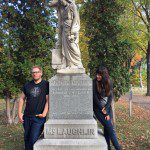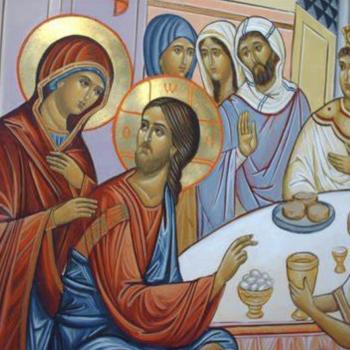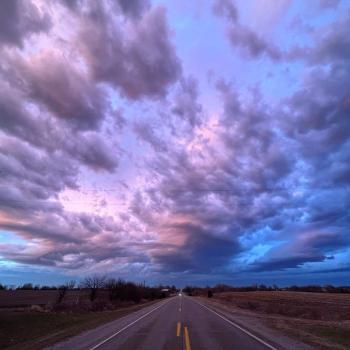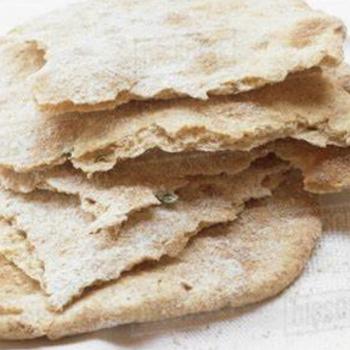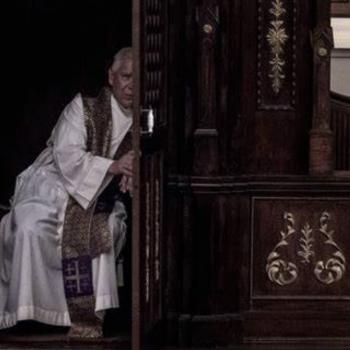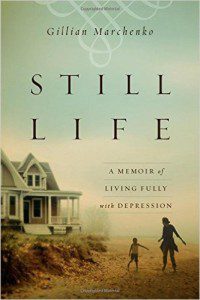 “I want us to recite the Lord’s Prayer together in the mornings as a family before we leave for school or work,” Sergei tells me.
“I want us to recite the Lord’s Prayer together in the mornings as a family before we leave for school or work,” Sergei tells me.
I roll my eyes. Our mornings are hurried. There is barely time for breakfast, clothes, teeth and hair. Do we need to add another thing? And mornings are still hard for me. Some days, although I try to be more present in my life and work the program, I don’t come downstairs to help at all. But we start learning the Lord’s Prayer anyway. Sergei prints it out from his computer and walks the girls through it, so they’ll know what it means.
Our Father in heaven, hallowed be your name.
“Okay, kids, so the prayer is to God, our Father. Do you know what hallowed means?” Sergei asks, and Elaina and Zoya shake their heads no. Polly mimics them, although she doesn’t understand the question. “Hallowed means to make or treat as holy. We are telling God we know that he is in charge and that we aren’t. It is important to start the prayer with this, because God is in control of everything, and whatever we pray needs to align with what he wants to do in us and in the world.”
My tongue goes dry. I think about hallowed. Hallowed be your name. In my depression, my focus is me. When in the pit, I am thinking about how to get out, not that God is in control. I’m not praying for help, even though I act like I do sometimes. I’m not sure I even want to align myself with what God wants to do in me and in the world, because I’m afraid it will mean more pain.
Charles Spurgeon, the most popular preacher of 19th century London, battled depression throughout his life. He said “If God is in control, if his name is hallowed, then that means he is in control of my depression. Fate is blind; providence has eyes.”
For a couple of weeks when we gather in the morning, the girls look down at their printouts. But soon the papers are discarded, and they repeat from memory:
Your kingdom come, your will be done, on earth as it is in heaven.
Your will be done. When God’s will seemed to be my will, this phrase leaped from my tongue. But now I am an ill woman with four kids and a busy, stressed-out husband. Do I really want to pray Your will be done? Do I want God’s will, or am I too deep into myself to care?
As I attempt to manage my depression better, I realize that I need to pay attention to God. But I don’t know how to do that. And I’m not sure I want to pay attention to God. I’m tired. I want to sleep.
We all grumble when Sergei says it is time to pray in the mornings. Elaina is looking for her sweatshirt. Zoya still needs to brush her teeth. But we stop what we are doing. We come together.
Give us today our daily bread. And forgive us our debts, as we also have forgiven our debtors.
Debt. Sin. It confuses me to think of my sin in regard to depression. Do I think my depression is because of sin? No . . . and yes. No because depression is an illness. I don’t believe I am depressed because of disobedience or lack of faith. And yes, because of the fall of humanity starting with Adam and Eve in the garden: the world is broken, and we all have to deal with that brokenness in various ways.
Here’s a harder question. Do I sin because of, or in the midst of, my depression?
I choose myself over everything and everyone else. Hyperfocus on myself is a root of pride. I hurt my family and friends often. Yes, I sin in my depression. And yes, I need to talk to God about it.
Even though I’m sure we don’t have time every morning to recite it, I start to look forward to the Lord’s Prayer, specifically the daily bread part, because I realize that in order for me to participate in my recovery, I need to show up to my life every day. And I realize I can’t handle the day any other way. Give us today our daily bread, not because I trust God with all my heart, but because I can’t handle any more impact on my life. I walk around the house waiting for the next bad thing to happen. I am give us today our daily bread, I start to find, in order to breathe. I’m give us today our daily bread with my face scrunched up and my feet ready to bolt if difficulty pops up around me.
In high school I got into a serious car crash with my mom. She drove, I dozed, and then out of the blue our car hit a railing and flipped a couple times on an overpass. We both walked away without a scratch. But after a person gets into a car accident, it can be hard for her to ride in a car. After our accident it took years for me to be comfortable in a moving vehicle again. I still can’t sleep in a car or an airplane, or anything else moving outside of my control.
Perhaps that’s why I’m sick and stressed and exhausted all the time. Perhaps that’s why I struggle with Evangeline. Lack of control. I brace myself for the next crash. The tension in my neck never ceases, and my worry and fear rob me of the here and now. I can’t see life because of the fear of what is next. That is why I’ve been escaping. That is why I still want to escape.
Polly stands in between her two big sisters, her black plastic glasses sliding down her nose and her pants falling a little off her butt. She has the prayer memorized now. When we get to the daily bread part, I cease speaking and listen. I listen to my husband’s voice. I hear the older girls speak. And my heart flutters when I hear Polly’s little voice say, “Give us today our daily bread.”
Polly, the little girl who catapulted me into the world of disability, the one I escaped from after her birth until God got my attention and reminded me that I am his child and that Polly is mine. The little girl who now is a walking antidepressant in my life, whom I love so much it makes my veins ache. My blood pumps hard and well with love for her.
I’m learning to plead for and rely on this part of the Lord’s Prayer. What I’ve known in theory for a long time now is necessity: I have a daily need for God.
The trick is not forgetting. The trick is, when able, not escaping. The trick is focusing more on him than on me. I don’t know how to do this, how to heal, how to show up, how to grow, so I’ll do a couple things today. I’ll wake up and “do before I think,” I’ll keep Bible verses and short assignments from my counselor in my wallet. I’ll walk the dog, hug Sergei goodbye and look the kids in the eye when they talk. I’ll bow my head and pray.
I want to escape from pain and guard myself from more. But that’s not realistic. Pain comes when it will. The challenge is to learn to live and be thankful, to not escape, day by day. To live in the present.
And lead us not into temptation,
but deliver us from the evil one.
For yours is the kingdom and the power and the glory.
Amen.
Gillian Marchenko is an author, national speaker, wife, mother, and an advocate for individuals with mental illness and special needs. She has written for many publications including Chicago Parent, Thriving Family, and Today’s Christian Woman. Gillian and her husband Sergei spent four years as church planters with the Evangelical Free Church of America in Kyiv, Ukraine and now live with their four daughters near St. Louis, Missouri. Gillian says that the world is full of people who seem to have their lives together. She speaks up for the rest of us.
This essay was adapted from Still Life by Gillian Marchenko. Copyright (c) 2016 by Gillian Marchenko. Used by permission of InterVarsity Press, P.O. Box 1400, Downers Grove, IL 60515-1426. www.ivpress.com


